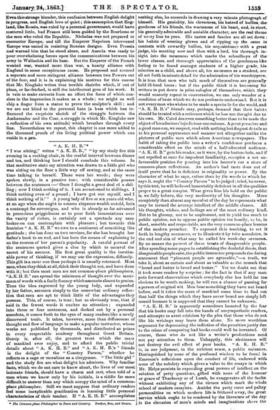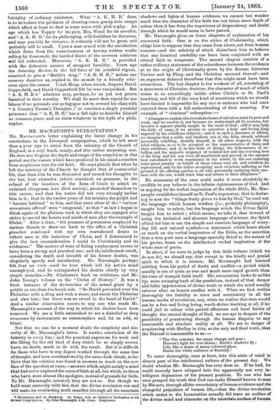"A. K. H. B."*
" I WAS sitting," writes "A. K. H. B.," "by my- study fire this evening in a rocking-chair, in the restful interval between dinner and tea, and thinking how I should conclude this volume. In that meditative state my attention was drawn to a little girl who was sitting on the floor a little way off sewing, and at the same time talking to herself. These were her words ; they were spoken slowly, in a pensive tone, with considerable pauses
between the sentences Once I thought a great deal of a
shil- ling; now I think nothing of it. I am accustomed to shillings. I think nothing even of a pound ; I have got one myself, and I think nothing of it.'" A young lady of five or six years old who, at an age when she ought to esteem sixpence wealth untold, feels a contempt for sovereigns, and who is already so far advanced in precocious priggishness as to pour forth lamentations over the vanity of riches, is certainly not a spectacle any sane looker-on can contemplate with pleasure ; but towards this feminine "A. K. H. B." we own to a sentiment of something like gratitude ; she has clone us two services, for she has brought her father's book to an end, and has been the means of explaining, to us the sources of her parent's popularity. A careful perusal of the sentences quoted gives a clue by which to unravel the secret of his success. His first great quality is the inestim- able power of thinking, if we may use the expression, diffusely. This gift is a rarer one than perhaps it is usually esteemed. Most men,whentheythink at all, think their thought out, and have done with. it; but then most men are not common-place philosophers. "A.K. H. B." can spread the minimum of thought over the maxi- mum of words with a facile fluency which amounts almost to genius. Thus. the idea expressed by the young lady, and expanded by her father, amounts simply to the somewhat ordinary reflec- tion that men are apt to think little of the advantages they possess. This, of course, is true ; but so obviously true, that if said in the fewest words it excites no attention ; expanded into three or four sentences, and decked out by a personal anecdote, it comes forth to the eyes of many readers like a newly discovered truth, it takes, however, more than diffuseness of thought and flow of language to make a popular instructor, whose works are published by thousands, and distributed as prizes in every respectable academy throughout Great Britain. Gossip is, after all, the greatest treat which the mass of mankind ever enjoy, and to afford the public trivial details about "A. K. H. B." and "A. K. H. B.'s " friends is the delight of the " Country Parson," whether he reflects as a sage or moralizes as a clergyman. "The little girl" and the study fire are what delight his admirers. Why familiar facts, which we do not care to know about, the lives of our most intimate friends, should have a charm and zest, when told of a man whom we know only by his initials, is a riddle far more difficult to answer than any which occupy the mind of a common- place philosopher. Still we must suppose that ordinary readers feel- some inexplicable gratification in learning little personal characteristics of their teacher. If "A. K. H. B." accomplishes * The Common place Philosopher in Town and Country. Parker, Son, and Bourn. nothing else, he succeeds in drawing a very minute photograph. of himself. His geniality, his cleverness, his hatred of :bullies, the goodness of his friends, the warmness of his heart, and, in short, his generallyadmirable and amiable character, are the real theme of every line he pens. His tastes and fancies are all set down ; his habits of wearing gloves and of ripping up the same in contests with cowardly bullies, his acquaintance with a great judge, his meeting now and then with a lord, his thorough in- sight into the meanness which marks the schoolboys of the lower classes, and thorough appreciation of the gentleman-like- feeling to be found amongst students of a higher grade, his miseries as a child, and above all, his successes as a student, are- all set forth in minute detail for the admiration of his worshippers. It is true that men who talk much of themselves are generally held ill-bred bores ; but if tho public think it is becoming for writers to put down in print eulogies of themselves, which they" would scarcely repeat in conversation, we can only wonder at a condition of taste which we do not profess to understand. But it is. not everyman who wishes to be made a spectasle for the world, and "A. K. H. B.'s" friends may, perhaps, demand that their habits. should be treated with a reticence which he has not thought due to his own. -Mr. Caird deserves something better than to be made the object of hisadmirers' injudicious encomiums. A great preacher and a good man can, we suspect, read with nothing but disgust de tails as- to his personal appearance aud manner not altogether unlike the pictures of public men which adorn American newspapers. The' habit of taking the public into a writer's confidence produces a considerable effect on the minds of a half-educated audience. "A. K. H. B." gets his reader, as it were, by the button-hole, and if' not repelled at once for impudent familiarity, occupies a not un- favourable position for pouring into his hearer's ear a store of common-place reflections. An author's bad taste does not of itself prove that he is deficient in originality or power. By the character of what he says, rather than by the words in which he says it, ought the "Country Parson " to b3 judged ; tried, however, by this test, he will be found lamentably deficient in all thequalities proper to a great essayist. What gives him his hold on the public' is, we fully believe, the very mediocrity of his thoughts. More completely than almost any moralist of the day he represents what may be termed the average intellect of the middle classes. All his thoughts, wishes, and feelings are of the most ordinary kin Notto be gloomy, not to be unpleasant, not to yield too much to. public opinion, not to oppose public opinion too hastily, to be, in short, sensible and respectable, are the very common-place lessons of the modern preacher. To expound this teaching, to set it forth in lengthy sentences, or to illustrate it by trite anecdotes, is. the end and aim of what may be called his week-day sermons.. By no means the poorest of these treats of disagreeable people. After spending some pages in establishing the doubtful thesis, that disagreeable people exist, the public instructor propounds the daring statement that "pleasant people are agreeable,"—a truth, we take it, about as certain and about as valuable as the remark that "bread and butter is bread and butter." Yet we doubt not that. it took some readers by surprise ; for the fact is that if any man puts forward observations which everybody else has held far too, obviohs to be worth making, lie will run a chance of passing for a person of original wit. Men hear something they have not heard before, and it takes the mass of mankind some time to find out that half the things which they have never heard are simply left unsaid because it is supposed that they cannot be unknown.
"A. K. H. B." is apparently sometimes haunted by the fear- that his books may fall into the hands of unsympathetic readers, and attempts to avert criticism by the plea that those who do not like his writings may leave them alone. No more worthless argument for deprecating the infliction of the penalties justly due to the crime of composing bad books could well be invented. Of course, those who do not like a writer's productions need not pay attention to them. Unhappily, this abstinence will not destroy the evil effect of poor books. "A. K. H. B." is, in our judgment, in the strictest sense, a public nuisance.. Dietingnished by none of the profound wisdom to be found in Emerson's reflections upon the conduct of life, endowed with none of the subtlety which gives a value to the essays in which Mr. Helps persists in expending great powers of intellect on the solution of petty questions, gifted with none of the humour or grace of Thackeray or of Lamb, he exaggerates all the faults. without exhibiting any of the virtues which mark the whole school of modern essayists. Amidst the petty cares and paltry personalities on which modern life is frittered away, the great service which ought to be rendered by the literature of the day is the elevation of men's minds and imaginations above the
triviality of ordinary existence. What "A. K. H. B." does, is to introduce the pettiness of drawing-room gossip into essays which affect at least to deal in some sense with philesephy. An age which has Tupper for its post, Mrs. Wood for its novelist, and ' A. K. H. B." for its philosophej., will doubtless be decorous, and may possibly be virtuous; it certainly will not be great, and probably will be small. Upon a man armed with the satisfaction which flows from the consciousness of having written works selling by thousands, the hardest blows of the severest criticism will fall unheeded. Moreover, "A. K. H. B." is provided with the defensive armour of arrogant humility. Years ago the Saturday Review, in tha full force of its youthful vigour, smashed to pieces "Smith's drag." "-A. K. H. B.," unless our memory deceives us, replied to the assault by a friendly ctiti- cism upon his censor. Uriah Heap, when struck, forgave David Copperfield, and David Copperfield felt lie was vanquished. But
A. K. H. B.'ts" admirers may, perhaps, be as yet not grown fanatical in their worship. "We shall be more than repaid for our labour if we persuade one pedagogue not to reward his class with " A Country Parson's Thoughts ;" or convince a single youthful prizeman that. "A. K. H. B." has a full right to describe himself as common-place, and no claim whatever to the style of a philo- sopher.































 Previous page
Previous page